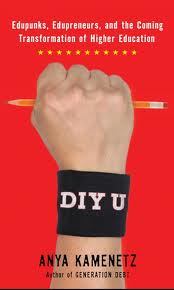I can’t believe I’ve gotten this far into the project without mentioning one of my favorite books written by one of my favorite writers on the subject of free learning: DIY-U whose author is the business/technology/education all-rounder journalist and author Anya Kamenetz.
Anya was one of the first people to popularize the notion of free as an alternative to paid learning in this 2009 article in Fast Company Magazine called How Web-Savvy Edupunks Are Transforming American Higher Education. In it, she highlights the work of a handful of innovators and entrepreneurs approaching the challenges of overpriced education and the opportunities for Internet technology to spread the ed at little to zero cost.
Of course, 2009 is ancient history and many of the innovations she discussed then have been enhanced or supplanted by new technology-driven options such as MOOCs which, if nothing else, package together the components of a college course in a way that means there are fewer things one has to do yourself (other than learn the material).
Her first follow-on book from her journalism work, DIY-U, asked a number of provocative questions regarding how our attitudes towards educational developed, and what roles institutions of higher education actually serve in our society. Some of the economic analysis I’ve done on this site regarding what people pay for when they pay for college was inspired by Kamenetz reflections.
While she did not create the term “edupunk” (which was coined by Jim Groom, one of the subjects in her original Fast Company story), that word sums up the spirit of the first free learning pioneers who were dedicated to “hacking education,” i.e., doing whatever it took to obtain the materials and create the communities needed to construct a form of higher learning that did not require becoming entangled with expensive and limiting higher ed institutions.
This is a spirit you can see embodied in projects like the Thiel Fellowship or the Uncollege movement, but as 2009 (when Anya wrote her Fast Company piece) gave way to 2010 (when DIY was published) and beyond, more options have gone mainstream that make do-it-yourself education an option for non-punks like myself tapping into resources created by decidedly un-punk folks like college administrators pushing choices like Open Courseware and massive online learning.
Anya has published two free e-books following up on her DIY work, including The Edupunks’ Guide (sponsored by the Gates Foundation) and Learning, Freedom and the Web (written in collaboration with the Mozilla Foundation).
I expect anyone reading this blog will get as lost in her thoughts as I did when I first picked up DIY-U. And one strain of that thinking (which asks why don’t Ivy League colleges admit as many people that want to attend) is a subject I’d like to take up tomorrow.

Leave a Reply